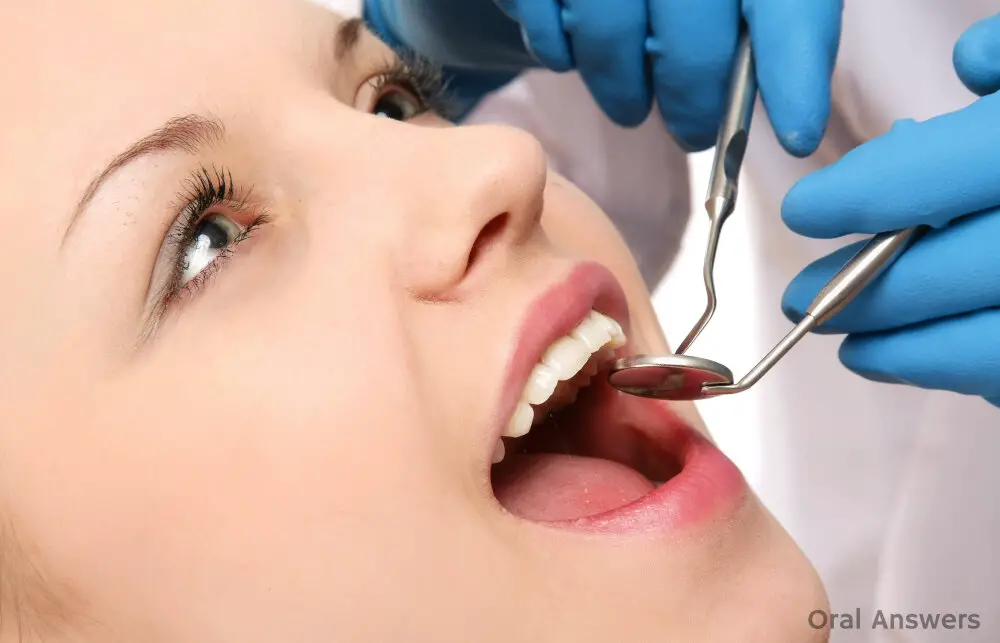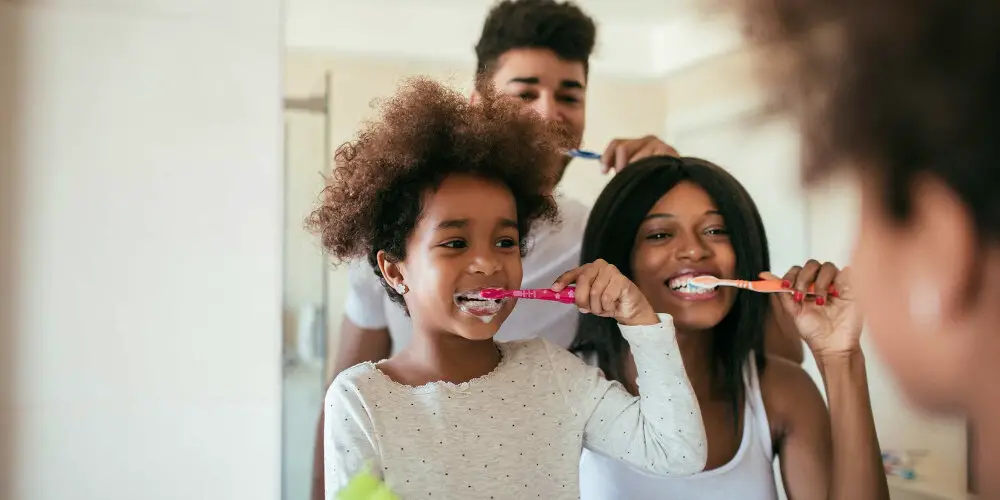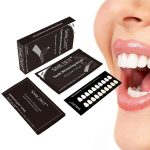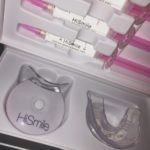Teeth Whitening: Discover How Long Hydrogen Peroxide Takes to Work

Having a bright, white smile is a highly sought-after aesthetic feature. Many people turn to teeth whitening treatments to achieve this look, and one popular ingredient in many of these treatments is hydrogen peroxide. But how long does it actually take for hydrogen peroxide to work in whitening teeth?Hydrogen peroxide is a chemical compound that has been used as a teeth whitening agent for many years. It works by breaking down the stains on the surface of the teeth, making them appear whiter. However, the amount of time it takes for hydrogen peroxide to work can vary depending on several factors, such as the concentration of the hydrogen peroxide, the duration of the treatment, and the type of stains being treated. In this article, we will explore these factors and provide insights into how long it typically takes for hydrogen peroxide to work in teeth whitening treatments.
Teeth staining is a common dental issue that can be caused by several factors, including poor oral hygiene, certain foods and drinks, tobacco use, and aging. Over time, pigments from dark-colored beverages like coffee, tea, and red wine can seep into the microscopic cracks and pores in the tooth enamel, causing discoloration. Smoking and chewing tobacco can also stain teeth due to the tar and nicotine content in these products. Additionally, as we age, the enamel on our teeth naturally wears down, revealing the yellow dentin layer underneath. While regular brushing and flossing can help prevent stains, professional teeth whitening treatments that use hydrogen peroxide can effectively remove stubborn discoloration and brighten your smile.
Teeth whitening has become increasingly popular as it provides a variety of benefits. Firstly, it enhances the appearance of teeth, making them look whiter, brighter and healthier, which can boost one’s confidence and self-esteem. Secondly, it can improve oral hygiene by removing stains caused by food, drinks and smoking, which can help to prevent tooth decay and gum disease. Furthermore, it’s a quick and affordable way to transform one’s smile as it takes only a short amount of time to achieve noticeable results. Lastly, it’s a non-invasive procedure that doesn’t require any surgery or needles, making it a safe and painless option for those who want to improve their teeth’s appearance.
Hydrogen peroxide is a potent bleaching agent that is commonly used to whiten teeth. It works by breaking down the chemical bonds between the molecules that cause stains, resulting in a brighter, whiter smile. Hydrogen peroxide is available in various concentrations, ranging from 3% to 35%, with higher concentrations typically providing faster results. However, it is important to note that hydrogen peroxide can cause tooth sensitivity and gum irritation when used in high concentrations or for extended periods. Therefore, it is recommended to use a lower concentration and to consult with a dental professional before beginning any teeth whitening treatment. Overall, hydrogen peroxide is a powerful whitening agent that can effectively brighten teeth, but care must be taken to ensure safe and effective use.
What is Hydrogen Peroxide?

Hydrogen peroxide is a clear, odorless liquid that has been widely used for various purposes, including as a disinfectant, antiseptic, and bleaching agent. It is a compound that consists of two hydrogen atoms and two oxygen atoms, which gives it the chemical formula H2O2. Hydrogen peroxide is commonly found in concentrations ranging from 3% to 35%, with the higher concentrations being more potent and potentially more dangerous. It is important to note that while hydrogen peroxide has many uses, it can also be harmful if used improperly, and it is essential to follow the instructions for use carefully. In the context of teeth whitening, hydrogen peroxide is a popular ingredient in many over-the-counter and professional teeth whitening products. When applied to the teeth, hydrogen peroxide breaks down into water and oxygen, releasing oxygen molecules that penetrate the enamel and bleach the underlying dentin. The concentration of hydrogen peroxide used in teeth whitening products can vary, with some products containing as little as 3% and others containing up to 35%. The higher the concentration, the faster the whitening process, but also the greater the risk of tooth sensitivity and other side effects.
Hydrogen peroxide is a chemical compound with the formula H2O2. It is a pale blue liquid which appears colorless when diluted. Hydrogen peroxide is widely used as a disinfectant, bleaching agent, and in the production of various chemicals. It is also used in the dental industry as a teeth whitening agent due to its ability to break down the molecules that cause discoloration on the teeth. Hydrogen peroxide works by releasing oxygen molecules, which penetrate the enamel and remove stains. The strength of hydrogen peroxide used in teeth whitening varies, with higher concentrations providing faster results but also increasing the risk of tooth sensitivity and gum irritation. It is important to follow instructions carefully and consult with a dental professional before using hydrogen peroxide for teeth whitening.
Hydrogen peroxide has been widely used as a whitening agent in teeth whitening products. When applied to the teeth, hydrogen peroxide breaks down into water and oxygen molecules. The oxygen molecules penetrate the enamel and dentin layers of the teeth, breaking down the stains and discoloration that may have accumulated over time. This process is called oxidation, and it is what makes hydrogen peroxide an effective whitening agent. The concentration and duration of the hydrogen peroxide treatment determine the extent and speed of the whitening effect. Higher concentrations of hydrogen peroxide can produce faster results, but they require careful application to avoid damaging the teeth and gums.
How Long Does it Take Hydrogen Peroxide to Work?

Hydrogen peroxide is a common household product that is used for various purposes. One of its most popular uses is for teeth whitening. Hydrogen peroxide is known to be effective in removing stains from teeth and providing a brighter, whiter smile. But how long does it take for hydrogen peroxide to work on teeth? The answer to this question depends on several factors. Firstly, the concentration of hydrogen peroxide used in the whitening product will determine how long it takes to work. Higher concentrations of hydrogen peroxide will provide quicker results, but they may also cause more sensitivity and discomfort. Secondly, the severity of the stains on the teeth will also affect how long it takes for hydrogen peroxide to work. Surface stains may be removed relatively quickly, while deeper stains may require multiple treatments over a longer period of time. Lastly, the length of time the hydrogen peroxide is in contact with the teeth will also play a role in the effectiveness of the treatment. It is recommended to follow the instructions provided with the whitening product and not to leave the hydrogen peroxide on the teeth for longer than recommended. Overall, the time it takes for hydrogen peroxide to work on teeth varies depending on the individual’s needs and the product used.
Several factors can affect the time it takes for hydrogen peroxide to whiten teeth. The concentration of hydrogen peroxide in the whitening product plays a significant role in determining the effectiveness and speed of the whitening process. A higher concentration of hydrogen peroxide will typically lead to faster results, but it may also increase the risk of tooth sensitivity or irritation. The length of time the product is in contact with the teeth also affects whitening time, with longer exposure times generally producing better results. Additionally, individual factors, such as the color and condition of the teeth, can impact the speed and level of whitening achieved with hydrogen peroxide. Overall, it is important to follow the instructions provided with the whitening product and consult with a dental professional to determine the best approach for achieving optimal results.
The average time for noticeable results when it comes to teeth whitening with hydrogen peroxide can vary depending on the individual’s teeth and the concentration of the solution used. Generally, it takes about 1-2 weeks of consistent daily use to see a visible difference in the shade of your teeth. However, it’s important to note that hydrogen peroxide should be used cautiously and in moderation as it can be harmful to the teeth and gums in high concentrations. It’s recommended to consult with a dental professional before beginning any teeth whitening regimen to ensure safety and effectiveness.
When it comes to teeth whitening, there are various agents available in the market, such as charcoal, baking soda, and other chemical agents. However, hydrogen peroxide has been found to be an effective whitening agent since it penetrates the enamel and eliminates the stains from the inside. In comparison to other whitening agents, hydrogen peroxide has been proven to provide more satisfying results, especially when used for extended periods. While other agents may show some results, they may not be as long-lasting and consistent as hydrogen peroxide. Therefore, if you’re looking for a reliable and effective whitening agent, hydrogen peroxide may be the best option for you.
Safety Considerations

When it comes to teeth whitening, safety should always be a top priority. Hydrogen peroxide is a common ingredient in many teeth whitening products, and while it can be effective at breaking down stains, it can also cause harm if used improperly. It’s important to follow the instructions provided by the manufacturer and not exceed the recommended usage time or concentration. Overuse of hydrogen peroxide can lead to gum irritation, tooth sensitivity, and even chemical burns. It’s also important to avoid swallowing hydrogen peroxide, as it can be harmful if ingested. Another safety consideration when using hydrogen peroxide for teeth whitening is the potential for damage to dental restorations, such as fillings or crowns. Hydrogen peroxide can break down the materials used in these restorations, causing them to deteriorate or discolor. If you have dental restorations, it’s important to consult with your dentist before using hydrogen peroxide for teeth whitening. They can advise you on the best course of action and may recommend alternative whitening methods that are safer for your restorations. By taking these safety considerations into account, you can achieve a brighter, whiter smile without putting your oral health at risk.
Teeth whitening is a popular cosmetic dental procedure that can enhance the appearance of your smile. However, it’s important to be aware of the potential side effects that can come with this treatment. One of the most common side effects is tooth sensitivity, which can cause discomfort when eating or drinking hot or cold substances. Additionally, some people may experience gum irritation or even chemical burns if the whitening solution comes into contact with their gums. It’s important to follow the instructions provided by your dentist or dental professional carefully and to report any side effects you experience.
Hydrogen peroxide is a common ingredient in teeth whitening products, but it should be used with caution to avoid any harm. Here are some tips to ensure safe use of hydrogen peroxide for teeth whitening. Firstly, always follow the product instructions carefully and do not exceed the recommended usage time or amount. Secondly, avoid swallowing hydrogen peroxide or letting it come into contact with your eyes or skin, as it can cause irritation and damage. Thirdly, consult with your dentist before using hydrogen peroxide products if you have any dental issues or concerns. Lastly, store hydrogen peroxide in a cool, dark place and keep it out of reach of children and pets. By following these safety tips, you can achieve a brighter smile without compromising your health.
It is highly recommended to consult a dentist before starting any teeth whitening treatment, including the use of hydrogen peroxide. A dentist can evaluate the condition of your teeth and determine if they are healthy enough for the procedure. Additionally, if you have any dental problems, such as cavities or gum disease, these issues should be addressed before any whitening treatment is started. A dentist can also provide guidance on the most effective and safe ways to whiten your teeth, as well as advise on the appropriate duration and frequency of treatment. By consulting a dentist, you can ensure that your teeth whitening experience is both successful and safe.
Alternatives to Hydrogen Peroxide

Hydrogen peroxide is a commonly used ingredient in many teeth whitening products, but it is not the only option available. Some people may be sensitive to hydrogen peroxide, while others may prefer more natural alternatives. One such alternative is baking soda, which has mild abrasive properties that can help remove surface stains from teeth. Baking soda can be mixed with water to create a paste that can be applied to teeth and left on for a few minutes before brushing and rinsing. Another natural option is activated charcoal, which can also help remove surface stains from teeth. Activated charcoal can be mixed with water to create a paste that can be applied to teeth and left on for a few minutes before brushing and rinsing. However, it is important to note that activated charcoal can be messy and may stain clothing and surfaces. Another alternative to hydrogen peroxide is carbamide peroxide, which is a gentler form of peroxide that is often used in professional teeth whitening treatments. Carbamide peroxide breaks down into hydrogen peroxide and urea, which can help brighten teeth without causing sensitivity. Some over-the-counter teeth whitening products may also contain carbamide peroxide instead of hydrogen peroxide. Additionally, some people may choose to use whitening toothpastes or mouthwashes that contain other ingredients, such as fluoride or baking soda, to help whiten their teeth over time. It is important to note that while these alternatives may be effective for some people, they may not produce the same results as hydrogen peroxide-based products. It is always best to consult with a dentist before starting any teeth whitening treatment to ensure that it is safe and effective for your individual needs.
In addition to hydrogen peroxide, there are several other teeth whitening agents available in the market. One of the most popular options is carbamide peroxide, which also works by breaking down into hydrogen peroxide. This agent is often found in at-home whitening kits and has been proven to be effective in removing surface stains on teeth. Another agent commonly used is sodium bicarbonate, which is also known as baking soda. It works as a mild abrasive to remove surface stains and also helps to neutralize acids in the mouth. Other agents, such as charcoal and coconut oil, have gained popularity as natural alternatives for teeth whitening. However, their effectiveness in whitening teeth is still under debate, and more research is needed to determine their long-term effects on oral health.
When it comes to teeth whitening, effectiveness and safety are two critical factors to consider. Hydrogen peroxide is a popular whitening agent due to its ability to break down stains and discoloration on teeth. However, the concentration of the hydrogen peroxide used can affect both its effectiveness and safety. While higher concentrations may yield faster results, they can also lead to increased tooth sensitivity and gum irritation. On the other hand, lower concentrations may take longer to work but are generally safer for teeth and gums. It is important to consult with a dental professional to determine the best hydrogen peroxide concentration for your teeth whitening needs to ensure both effectiveness and safety.
When it comes to teeth whitening, it’s important to consider individual needs. Some people may have more severe staining or discoloration than others, and therefore may require a stronger or longer treatment. It’s also important to consider any existing dental issues, such as sensitivity or gum disease, which may impact the whitening process. Consulting with a dentist or dental professional can help determine the best course of action for achieving a brighter, healthier smile. In addition to professional guidance, there are a variety of at-home whitening options available, such as hydrogen peroxide treatments, which can be effective but require careful use and monitoring. Ultimately, finding the right whitening method for your needs can help you achieve the results you desire while maintaining good oral health.
Teeth whitening is a cosmetic dental procedure that is gaining popularity among people of all ages. It involves the use of various chemical agents, including hydrogen peroxide, to remove stains and discoloration from the teeth. The benefits of teeth whitening are numerous, including a brighter, more youthful smile that can boost confidence and self-esteem. Furthermore, teeth whitening can improve oral hygiene by reducing the risk of gum disease and tooth decay. It is a safe and effective procedure that can be performed in a dental office or at home with the use of over-the-counter products. Overall, teeth whitening is a great way to enhance the appearance of your smile and improve your oral health.
Understanding the whitening time of hydrogen peroxide is crucial in achieving optimal results when it comes to teeth whitening. Hydrogen peroxide is a powerful bleaching agent that effectively breaks down the stains and discolorations on the teeth. However, it is important to note that the whitening time of hydrogen peroxide varies depending on the concentration and the amount of time it is in contact with the teeth. Using a higher concentration of hydrogen peroxide can lead to faster whitening results, but it can also increase the risk of tooth sensitivity and damage to the enamel. It is essential to consult with a dental professional to determine the appropriate concentration and duration of hydrogen peroxide application to ensure safe and effective teeth whitening.
When it comes to teeth whitening, it’s important to prioritize safety and effectiveness. One of the best ways to achieve this is by opting for professional teeth whitening services from a licensed dentist. They can use a combination of high-quality products and state-of-the-art techniques to brighten your smile without causing damage to your teeth or gums. If you prefer to whiten your teeth at home, make sure to use products that have been approved by the American Dental Association (ADA) and follow the instructions carefully. Avoid using homemade remedies or excessive amounts of hydrogen peroxide, as these can be harmful to your dental health. Additionally, maintain good oral hygiene practices, such as brushing and flossing regularly, to keep your teeth healthy and prevent future discoloration. By following these recommendations, you can achieve a brighter, healthier smile safely and effectively.
Conclusion

In conclusion, hydrogen peroxide is a popular and effective ingredient used in teeth whitening products. The amount of time it takes for it to work varies depending on the concentration of the hydrogen peroxide and the individual’s teeth. It is important to follow recommended usage and not overuse the product, as this can lead to sensitivity and damage to the enamel. It is also important to note that hydrogen peroxide is not a permanent solution and regular maintenance is necessary to maintain a bright, white smile. Overall, with proper usage and care, hydrogen peroxide can be a safe and effective way to achieve a brighter, more confident smile.






